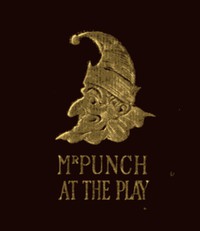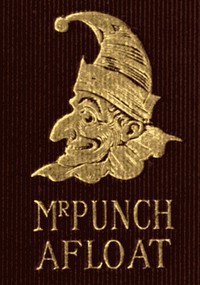Mr. Punch's Country Life: Humours of Our Rustics by J. A. Hammerton (top 100 books to read .TXT) 📗

- Author: J. A. Hammerton
Book online «Mr. Punch's Country Life: Humours of Our Rustics by J. A. Hammerton (top 100 books to read .TXT) 📗». Author J. A. Hammerton
Deacon MacBrose. Gae forrard, Sandy, gae forrard!
Deacon MacTavish (after stumbling ahead for several yards). Weel, Donald, hoo gae they?
Deacon MacBrose. Richt bonnily, Sandy, richt bonnily. But wha's the mon that's walking beside ye?
From the Mining Districts.—(Young Curate finds a Miner sitting on a gate smoking.)—Curate (desirous to ingratiate himself with one of his flock). A fine morning, my friend.
One of his flock gives the slightest nod, and a grunt, and spits.
Curate (supposing that he had not been heard). A fine morning, my good friend.
One of his flock. Did I say it warn't. Do you want to hargue, you beggar?
[Pg 51]
Lady. "And you say you have been brought to this by your wife?"
Tramp. "Yuss, lidy. I got 'er three good jobs, and 'er bloomin' independence lorst 'er the lot of 'em!"
[Pg 52]
Scene—The Hall of a Country House. Guests arriving for dinner.
Perkins (the extra man who is had in to help at most dinners given in the neighbourhood—confidentially but audibly). "Good evening, Miss Waters. There's some of that nice pudding here to-night, what last time you took twice of!"
[Pg 53]
The Bishop of Lichbury. "Really, it's very shocking to read in the papers so many painful cases of wife-beating and assault among the labouring classes!"
The Rev. Mr. Simmiel. "It is indeed, my lord. Indeed—ahem—with your lordship's permission, one might almost call them belabouring classes."
[Pg 54]
Parson. "Good morning, Mrs. Stubbins. Is your husband at home?"
Mrs. Stubbins. "'E's 'ome, sir; but 'e 's a-bed."
Parson. "How is it he didn't come to church on Sunday? You know we must have our hearts in the right place."
Mrs. Stubbins. "Lor, sir, 'is 'eart's all right. It's 'is trowziz!"
A Poacher's Paradise.—About an hour from town.—Charming bijou residence ... grounds adjoin a large pheasant preserve; owner going abroad.—Advt. in "Standard."
"A Crop Expert."—A professional hair-dresser.
[Pg 55]
New Curate (who wishes to know all about his parishioners). "Then do I understand you that your aunt is on your father's side, or your mother's?"
Country Lad. "Zometimes one an' zometimes the other, 'ceptin' when feyther whacks 'em both, sir!"
[Pg 56]
Mr. Spinks. "I had such a beautiful dream last night, Miss Briggs! I thought I was in the Garden of Eden——"
Miss Briggs (with simplicity). "And did Eve appear as she is generally represented, Mr. Spinks?"
Mr. Spinks. "I—I—I—I—didn't look!"
[Pg 57]
Professional Partnership.—Village Organ-blower (to Lady Organist, who has been trying a new voluntary). "How did it go, marm?" "Oh, all right. Why do you ask?" "Well, marm, to tell you the truth, I was a bit nervous about it. You see, marm, I've never blowed for that piece afore!"
[Pg 58]
FARM NOTESHow to Winnow Corn. 1st Method.—Get some corn. Get somebody who knows how to winnow it. Let him do it.
2nd Method.—If you know all about it, do it yourself.
3rd Method, for Beginners, given in Agricultural Terms. Place a steward near the blower, and let him drive the blower while the hopper is filled with a large wecht. (This is called the system of Hopper-ation.) Then let a woman with a small wecht slide down on a wheel crushing the blower with her shoes. This should be done in a neat, cleanly way until the scum has been swept with a besom through a wire screen, while another lot go on riddling, when it is the duty of the fanner to answer each riddle as it comes out. The fanner's chief work is, however, to prevent any labourer becoming too hot. When a labourer is very warm, he sits down before the fanner, who soon restores him to coolness.
Treatment of Fowls in Winter.—Roast them.
For the Volunteer-farmer in Winter.—Attend turnip drills.
[Pg 60]
How to Pickle Pork.—Get the hog into a proper temperature. To bring this about make him swallow a small thermometer. This'll warm him. Rub him with paper dipped in oil, give him a uniform coating of barley, tar, syrup of squills, pitch, and gold tin-foil. Paint his head green with orange stripes, and by that time he'll be in a pretty pickle.
Breakfast.—Always visit your poultry yard before breakfast. If unable to find a fresh egg, go to the cattle sheds. Remember that, where eggs cannot be obtained, a yoke of fine oxen beaten up with a cup of tea is most invigorating.
[Pg 59]
Political Garden Party in the Provinces.—
Great Lady (speeding the parting guest). "So glad you were able to come!"
Mayoress. "Oh, we always try to oblige!"
Agricultural.—A South of England farmer writes to us to say, that he has an early harvest in view, as he has already got three ricks in his neck, and is doing very well.
Further Illustration of the Mining Districts.—
First Polite Native. "Who's 'im, Bill?"
Second ditto. "A stranger!"
First ditto. "'Eave 'arf a brick at 'im".
How to treat rough Diamonds.—Cut them!
[Pg 61]
District Visitor. "Well, Mrs. Hodges, going to have a cup of tea?"
Mrs. Hodges. "Oh no, miss; we're just goin' to 'ave a wash!"
[Pg 62]
"Well, Johnson, been to the doctor, as I told you?"
"Yes, m'lord."
"And what did he say was the matter with you?"
"'E says it's just general ability, m'lord, that's all!"
[Pg 63]
Sagacity.—Countryman. "Fi' pounds too much for him? He's a won'erful good sportin' daug, sir! Why, he come to a dead pint in the street, sir, close ag'in a ol' gen'leman, the other day—'fust o' September it was, sir!—an' the gen'leman told me arterwards as his name were 'Partridge'!"
Customer. "You don't say so!" [Bargain struck.
[Pg 64]
HORTICULTURE UP TO DATEStimulated by the recent achievements of a horticulturist, who is about to place on the market the "pomato," a blend of the apple and tomato, and the "plumcot," a mixture of plum and apricot, Mr. Punch hopes soon to be able to announce the successful rearing of the following novelties:—
The Cumberry.—This may be regarded either as a very long gooseberry or a very short cucumber, according to fancy. When fully ripe the skin is thin and the contents pulpy. Unripe it is like a cobble, and may be used as such. Mr. Punch is disposed to think that the over-ripe cumberry will be very popular at elections, especially when eggs are scarce. The hairy variety looks like a fat caterpillar, and makes very good grub.
The Mistletato, a happy combination of the romantic and the domestic. This fruit, which has a very piquant flavour, has been grown in a small patch of soil, concealed, like King Charles, among the branches of an oak. Hence it is not surprising that the Mistletato should combine the [Pg 66]nourishing qualities of the homely tuber with the sentimental associations of that plant which was revered by our Druid ancestors and is beloved by modern maidens. It should be a popular dish at wedding breakfasts.
The Pumpkonion promises well and seems likely to combine the amplitude of the pumpkin with the pungency of the onion. Mr. Punch is of opinion that a machine will have to be invented for dealing with this vegetable, as to handle it would be too severe a tax upon the cook's lachrymal glands.
The Turniparrot and the Parsniparagus are not yet sufficiently developed to be described with any confidence. Many others are only in an incipient state at present, but Mr. Punch hopes to be able before long to announce that he has brought several to maturity, including the Collage and the Cabbyflower.
[Pg 65]All's Well that Ends Well.—
Stepmother (entering village school with whip). "My boy tells me you broke your cane across his back yesterday?"
Schoolmaster (turning pale). "Well, I—I may have struck harder than I intended, but——."
Stepmother. "I thought I'd make you a present of this whip. You'll find it'll last longer and do him more good!"
A Riddle from Colney Hatch.—Q. Why have we reason to suppose that a bee is a rook?
A. Because.
The Origin of Rural Decadence.—Through communications corrupt good manners.
[Pg 67]
Priest. "Wilt thou have this woman to thy wedded wife?"
Bridegroom Elect. "Well, aw's warned aw'll hev to hev her. But aw wad rayther hev her sister!!"
[Pg 68]
The Vicar's Daughter. "Awfully cold, isn't it, Mrs. Muggles?"
Mrs. Muggles. "Yes, my dear. But, bless ye, I'm lovely and warm!"
[Pg 69]
Miss Townley. "I think the country is just sweet. I love to see the peasant returning to his humble cot, his sturdy figure outlined against the setting sun, his faithful collie by his side, and his plough upon his shoulder!"
[Pg 70]
The Bishop of Lichborough (who has been on a visit to a sporting squire). "Now, I wonder if your man has remembered to put in my pastoral staff?"
William (overhearing). "Yes, my lord. I've put your lordship's gun-case into the carriage!"
[Pg 71]
Curate, after weeks of serious reading and conversation with Gaffer Stokes without much apparent result, is at last rewarded by a look of rapt exaltation on the Gaffer's face.
Gaffer Stokes. "A-men! That's the first wopps I see this year!"
[Pg 72]
Sympathetic Cousin. "Poor boy! I'm so sorry you didn't pass your exam. What was the reason, I wonder?"
Poor Boy (also wondering). "I can't think."
[Pg 73]
Obliging Country Butcher. "Let me cut it into cutlets for you, ma'am,—leaving just enough bone for you to hold 'em by, while you're eating 'em!"
[Pg 74]
Wages and Wives.—Philanthropic Farmer. "Well, Tompkins, after this week, instead of paying you partly in cider, I shall give you two shillings extra wages."
Tompkins. "No, thanky', master; that won't do for me!"
Farmer. "Why, man, you'll be the gainer; for the cider you had wasn't worth two shillings!"
Tompkins. "Ah, but you see I drinks the cider myself; but the ow'd 'ooman 'll 'ev the two shillun'!!"
A Puzzle in Horticulture.—Little Chris. Daddy, what makes onions?
Daddy. Seeds, of course.
Little Chris. Then what makes seeds?
Daddy. Onions.
Little Chris (triumphantly). Then why don't us feed the canary on onions?
[Discomfiture and retreat of Daddy.
Agricultural Question.—Is a landlord who allows his farms to be over-stocked with rabbits entitled to be called a great bunnyfactor?
[Pg 75]
Wife. "Well, did ye find th' puddin' I left for you in the saucepan?"
Collier (whose favourite dish is boiled puddings). "Oh, ay; I found it right enough. It were a stunner!"
Wife. "Did you take the cloth off?"
Collier (after a pause). "Were there a cloth on?"
[Pg 76]
Rector (short-sighted). "Well, Richard, hard at work, eh? Let me see, you are Richard, aren't you?"
Labourer. "No, sir, oi be John, sir. You 'ad the pleasure o' buryin' Richard last week, you remember, sir!"
[Pg 77]
First Tramp. "Why don't you go in? 'E's all





Comments (0)